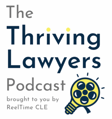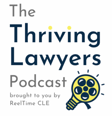Become a Creator today!Start creating today - Share your story with the world!
Start for free
00:00:00
00:00:01

Kathryn Burmeister, Esq.-Overcoming Addiction to The Status Quo
Join Michael Kahn for an informative and thought-provoking interview with Kathryn Burmeister, an unconventional, animal-loving lawyer, author, and speaker.
Connect with Kathryn on her various social media accounts!
Transcript
Unsustainable Work Habits
00:00:02
Speaker
pulling long nights or working on the weekends, but it is not going to be the norm for me and it's just not a way to live life at that level. It's just not sustainable from a very basic standpoint, but it's also not fulfilling to any degree, if anybody's really honest with themselves about it.
Introduction to Katherine Burmeister
00:00:25
Speaker
Welcome back to The Thriving Lawyers Podcast. In this week's episode, join Michael Kahn for an informative and thought-provoking interview with Katherine Burmeister, an unconventional animal-loving lawyer, author, and speaker. Hi, everyone. This is Michael Kahn, co-founder of Realtime Creative Learning Experiences and The Thriving Lawyers Collective. More to come on that in the weeks to come. But welcome back to The Thriving Lawyers Podcast.
Katherine's Background
00:00:54
Speaker
And we have a very interesting guest today, Catherine Burmeister, who is the founder of Burmeister Law Firm, which have offices in Roswell and Atlanta, I believe. Catherine, you can correct me on that. And she's also the author of Overcoming Addiction to the Status Quo, which I think is
00:01:20
Speaker
very interesting title and I'm looking forward to talking to Catherine more about the title and the book itself. So Catherine, welcome to The Thriving Lawyers podcast. Thank you for having me. I'm excited to be here. I am too as well. Catherine and I actually met
Sharing Experiences Through Podcasts
00:01:40
Speaker
at a program for the, Katherine again, tell me if I have this right, the North Fulton County Bar Association? Yep. Is that right? That was it. Okay. Did a program, I believe it was wellness related or something like that two months ago and Katherine was attended and then we've connected since then.
00:02:05
Speaker
And she has very graciously offered to do this podcast interview. And we were talking before we started recording, and apparently Catherine has done so many podcast interviews, she couldn't remember one that I asked her about, so it was hard for her to remember. So she's out there talking about her experiences as a lawyer and about the book. And I think the more she's out there talking about this, the better for the legal profession.
00:02:34
Speaker
and completely, not that you need my support, Catherine, but I say more power to you. I appreciate that. Especially running your own law firm too and doing podcasts. I don't know how you do it all. Yeah, it's been a little busy, but it's been great to have those conversations with a bunch of different people and have people receiving it so well.
00:02:54
Speaker
Great, great, yeah. So I'm going to start with, Catherine, I looked at your website and you had a quote on there. Let's just start with your practice as a lawyer and then we'll have a lot of time talking about the book.
Unconventional Law Practice
00:03:09
Speaker
But on your website, about the Burmeister law firm, you say that you're an unconventional lawyer, well, unconventional and animal-loving lawyer. So I want to have you just expand on that a bit. I'm intrigued by the unconventional piece, and I'm drawn to the animal-loving piece because I am a real animal lover and chickly.
00:03:35
Speaker
So let's talk about that quote. Tell me more about what you mean by unconventional lawyer.
00:03:40
Speaker
Definitely. So I practice personal injury exclusively, but even just as a lawyer, I consider myself unconventional first and foremost because I really bring a holistic approach to my clients. I tailor their needs and my response to their needs based on what's best for them at the end of the day. I don't try to fit them into a particular mold, whereas so many people
00:04:05
Speaker
You know, I think really it's either the churn and burn firms that are PI firms, you know, the billboard ad type people that are just running through cases as fast as they can. Or a lot of people just don't care, quite frankly. I mean, we all have to make a living. I appreciate that. But we don't have to do at the expense of our clients. And I think a lot of people have lost sight of that or just never had sight of it to begin with.
00:04:28
Speaker
So being holistic with my legal approach and then also running my practice. I've been remote since before COVID. So I started my firm in fall of 2018.
00:04:39
Speaker
And I want to keep my overhead low to begin with. So I didn't get dedicated office space. I did know that I was going to need some help because while I've done everything from legal secretary up until lawyer and my career, it's way too much for personal injury in particular to do it all yourself and then also be bringing in all the work on top of it. So I've run everything remotely and I've stayed that way. And I've had paralegals that are all out of state and I've had them for two years working for me.
00:05:08
Speaker
really kind of turning everything on its head in terms of the convention of
00:05:13
Speaker
the legal profession as a whole. I think a lot of people think that it has to be a certain way because it's been that way for so long and it's a very antiquated profession generally. So people fall into that trap of thinking it has to stay that way because somebody said it did a long time ago. So I'm always about pivoting when I need to, learning new things, trying other things out. I always think there's room for improvement and there's better ways to do things that I may not have come across yet. So that's what I mean by unconventional.
00:05:44
Speaker
Yeah, and I like what you said about there's nothing sacred about some of these, the aspects of practicing law. I'm a former lawyer and currently a licensed professional counselor therapist. And I tell clients that all the time. There's nothing special about the 50-minute hour. That's kind of like the magical time that most of us therapists have come up with to meet with clients.
00:06:14
Speaker
There are some sessions with clients that end after a half hour because they're done. They've gotten what they need. And there are some that I've, yesterday I did an hour with a client because that ending at 50 minutes just would not have been helpful for that client. And it's consistent, Catherine, with the title of your book.
00:06:35
Speaker
And again, we'll go to the book in a moment, but the whole idea of the status quo, you're definitely opposed. You fight against the status quo both personally and it sounds like professionally.
00:06:46
Speaker
I do, I do. It's something that I had to work really hard at and it was basically out of necessity that came about. But I do believe that we can consciously make a choice to overcome that addiction to the status quo.
Addiction to the Status Quo
00:07:00
Speaker
And when I say addiction, I genuinely believe it is. I'm not here to say one addiction is worse than another. They're all bad. I am here to say though, that the addiction to the status quo, I think leads to a lot of other problems.
00:07:13
Speaker
because our obsession with really focusing on what we should be in our life, you know, these preconceived eyes, societal shoulds, you know, we should be a certain way, we shouldn't be a certain way. It's either we pushing ourselves or, you know, it's being externally forced on us by other people. It really catches us, you know, doing a lot of things that I don't think inherently most people would do, right? I mean, we all know
00:07:40
Speaker
as an example, stealing money is bad. But how many people have we heard of or seen in the news that do it? And you think, how could they possibly be doing that? Or they seem like a really good person? Why would they do that? And it's because they're caught up in the status quo.
00:07:55
Speaker
And, you know, I don't think everybody is bad. It's just we've all kind of become obsessed with this idea of what should be in our lives. And a lot of people, I think, fall into a trap of going down that road toward their own detriment and the detriment of a lot of other people because it doesn't happen in a vacuum. Yeah, you say in your book that I'm just reading one of one of the quotes from your book, perhaps to varying degrees and at different points, one can have some
00:08:23
Speaker
Some things together, but the majority of the time it's all just plowing onward head down and addicted to the status quo. Comfort is taken in the idea that one just may be doing a little better than the next person, or even if that's not the case, one can pass as being successful while continuing to succumb to losing pieces of oneself ever so slowly. Would you say, I assume you're speaking about your own experience there,
00:08:52
Speaker
I am. I definitely fell into the thought of if I work hard enough, I'll get to where I want to be or where I deserve to be. I say deserve after hard work, not that I'm entitled to anything. But the reality is life doesn't go as planned and nothing is guaranteed.
00:09:13
Speaker
So despite knowing that, I still continue to plow ahead and everybody keeps up that facade and that mask and the armor of I'm successful and success is very, very often measured by money.
00:09:29
Speaker
accomplishments professionally, what kind of house you have, what kind of car you have. I was more focused on my professional accomplishments. I valued myself based on my identity as a lawyer and what I could accomplish. I've wanted to be a lawyer since I was in middle school. And because of that, I obviously put a huge amount into my life invested in getting to that point.
00:09:51
Speaker
So thinking okay, if I invest enough time I'll get to where I want to be and then having all that thrown out the window When the rug was jerked out from underneath me a few times Really made me realize one that that's not how life works to it's not a fulfilling way to go through life at the end of the day Yeah, and and
00:10:15
Speaker
And you go on further in your book, if you don't mind me sharing another quote, that your status quo, yours, my status quo addiction, manifested in the following ways, addicted to being perfect, believing I should always be and do more, believing that if I didn't accomplish certain things by a certain time or way, it wasn't enough, believing that no matter what I accomplished, it was not enough.
00:10:40
Speaker
believing that my anxiety and depression, though actively managed, was a weakness and a failure on my part, underestimating my abilities, thriving off external validation and more. Yep, all those. Yeah.
00:10:58
Speaker
I think a lot of it, and I talk about in the book a little bit, I think we're a product nationally of our environment, and then also part of who we are, just how we're wired. I was raised, I'm an only child, but I was raised by very involved parents that weren't helicopter parents at all, just very involved in what I was doing.
00:11:20
Speaker
was someone who achieved above average. And so from an early age, that standard was kind of set for me. So anything less than what my normal was, was below my average. So, you know, and my parents never said like, oh, if you aren't doing X, Y, and Z, you're a failure. That was never said. And it wasn't even applied. But because I got so much
00:11:43
Speaker
praise from family, from, you know, teachers, like we all do, it's easy to get swept up in that idea that your value is tied to what you can do, not who you are. The external validation you mentioned. Yeah. So you, and my guess is, and you wrote this book, not just for lawyers, right? Because I noticed in the book you directed some discussion to other professionals like doctors and entrepreneurs and professional athletes.
00:12:13
Speaker
This is something not unique to lawyers necessarily. No. And really, addiction to the status quo is not unique to any one group of people. I mean, I think even a stay-at-home mom can get swept up in trying to keep up with what everybody else is doing. But the reason I talk to professionals, and particularly professionals in zero, some professions, so doctors, lawyers, nurses, corporate executives, and elite athletes, are
00:12:37
Speaker
It manifests, the addiction to the SAS quo manifests itself more drastically, I think, and more quickly in those professions. So very much in elite athletes, if they're not winning, they're losing. For me, if I'm not winning cases, I'm losing. With doctors and nurses, if people aren't surviving, they're dying.
00:12:58
Speaker
And a corporate sense too, I mean, it's just, it's such a high pressure position that if you're not succeeding, you're failing. And it's easy to be reduced to that instead of who you are and what you're accomplishing. And we all know, I think intuitively that the world is not black and white, but by God, we still try to live by that every day, I think. So really showing that those professions are victims of the status quo, I think more often than other areas.
00:13:29
Speaker
Yeah, and I want to drill down a little deeper with you personally. You said earlier the rug was pulled out from under you a couple of times, or a few times. I want to hear more about that. But before we go there, I also want to have you respond to the idea of the, we did a workshop, I do a workshop called Bolstering Resilience with a couple of colleagues.
00:13:56
Speaker
And the focus is on the individual, is for lawyers, on what they can do differently to bolster the resilience. And at the end, we had a Q&A, and one of the participants said, this is all well and good, but you know, if we need to talk about, you're putting all of the responsibility on the individual,
00:14:18
Speaker
You're not talking at all about the systemic nature of the problem here. I'm talking about law. Right. And it was a great comment. And we spoke more about it after that question, of course. But I'm curious, your thoughts about that, that the individual can be addicted and the individual can do things that help build their resilience and their ability to find contentment in the law
00:14:49
Speaker
But what about if the system itself is unhealthy? I think it makes it harder, undoubtedly. And sometimes we have to go through experiences like I did where, you know,
00:15:02
Speaker
You see the really bad side of things. But I really think the only thing we can control is our response to those things. So yes, in a perfect world, we would revamp the legal profession, but I don't think that's happening anytime soon. Billable hours aren't going anywhere. No, no.
00:15:20
Speaker
But I have to say, you know, a lot of bars are talking about mental health and suicide prevention. So I think we're making headway, but it can't just be lip service, right? And it can't just be either you're, you're happy or you're suicidal. There's, again, a lot of gray in between those two points. That's right. There's the not thriving, there's a not thriving part between.
00:15:44
Speaker
doing great and addicted. And the wellness, are you familiar with the, I don't know the exact name of it, but the Wellness Institute on Lawyer Wellbeing? Yes, I am. Yeah. So they talk about that in the report that they put out a couple years ago that there's that huge in between place of folks who are not addicted and not doing great. They're that kind of just not thriving. Right. Right. And I'm really trying to reach those people because I think it's
00:16:14
Speaker
I felt this way and I think a lot of people who are achievers do feel this way. The idea that if you're not happy, especially when you see all these things that you have, right? So if you are working at a good law firm and you do have a number of cases and you've won a number of cases and you're growing professionally, why aren't you happy? I think we start to think that we're deficient in some way.
00:16:37
Speaker
And it comes from a place of privilege, right? I mean, we have the we have a great job in theory, right? We're, you know, we have means to cover our basic needs. But it doesn't mean that people don't still experience emotional hardship. And we don't really sit and figure out what that is. Because I always thought if I checked off all these boxes, I'm a recovering box checker, by the way.
00:17:01
Speaker
if I checked off all these boxes. I'm a recovering lion, lion cross her outer. Okay. Yeah, yeah, yeah. I would be happy. And so when I got my dream job, it was probably three months, four months after that, that I sat there and went, well, what do I do now? I don't know what to do with myself. And I don't have that, you know, euphoria of being happy. So
00:17:26
Speaker
What's gone wrong? What haven't I done? And again, it goes back to it's not the egotistical for me. It was just I I could only control myself. So I must have done something wrong. And that's just not not the reality. You can't happiness is not something you check off.
00:17:42
Speaker
And it's not something that once you achieve it, it stays there without any work. It's definitely an ongoing part of your life, but it becomes a whole lot easier and more manageable, I believe, with experience and practice at it. But it takes getting over the addiction to the status quo, first and foremost, to even start down that path.
00:18:04
Speaker
Yeah. So why don't we, I want to obviously have you speak about how you did that. So the, I think, uh, the listeners will benefit from what worked for you. But before we go there, share, if you would, just as much as you want, what you referred to earlier about the rug being pulled out from under you. And as you talk about in your book, hitting rock bottom, uh, I, um, I,
00:18:35
Speaker
past the bar, I was working for a partner
Personal Turmoil and Professional Chaos
00:18:38
Speaker
who made a lot of promises and said he was willing to invest in me. And he basically reneged on those promises and I was told I was a luxury that he couldn't afford. I just didn't really know how to take that. And then I held out for another plaintiff's job because I've worked big law before I got my license and there was no way I was going back to that.
00:19:01
Speaker
As a, did you say a legal assistant? Yeah, as a document clerk. And I saw how soul sucking that was for so many people, attorneys, you know, admin across the board. It's just a very, it's just a, it is a soul sucking environment. And I think very few people disagree on that point.
00:19:22
Speaker
Maybe if they came up in the 90s when it was all glamorous and they actually got to try cases, but nowadays I feel like it's very different mentality and model than it used to be.
00:19:34
Speaker
I got, I held out for that dream job. I found it. I found a partner who had been practicing for 30 years who had a couple associates close to my age and really taught us by letting us do it. And he's always there for support and guidance, but he didn't try to keep us under his thumb. So he taught us really well. And I learned a ton in a relatively short amount of time. I was managing my own cases.
00:19:58
Speaker
Um, I had a paralegal that helped me with things. I was doing, um, you know, depositions, uh, doctor's depositions. So he really taught us well. And I'd say about a year and a half after I'd started there, I got a call. Well, I got texts early in the morning and it was from the, the senior associate. He said that the attorneys need to be in before staff. And in my mind.
00:20:23
Speaker
again, because I've had that mentality that I'd had for so long. It's like, well, I did something wrong. Clearly, this wouldn't be happening if I hadn't done something, which is silly, but that's when you know, when you've told yourself that for so long, and that's your internal dialogue, it's just natural to go to that. So we got there. Catherine, if I can interrupt just for a second, would you say you were the type of person who, when something bad happened, it was
00:20:50
Speaker
It was your responsibility, but something good happened. It was something external to you, or were you able to also take responsibility for the good things too?
00:21:04
Speaker
could take responsibility for the good. But I had a hard time accepting compliments. So I may see that I have put effort into it. But it's it was almost that. Okay, well, that's great. But that's the way you should have done it to begin with, like should be over. But that right, it's not that big deal. So that's how I was. And yeah, we came in that morning, and it was just us associates. And
00:21:33
Speaker
Our senior associate told us that our partner had committed suicide. He wrote letters. He left letters for us. He left letters for the bar, the state bar. He left letters for his daughters. And he had been stealing from clients for eight years. So aside from the shock of someone
00:21:56
Speaker
taking their own life. There was obviously the rest of it that had to do with the clients and reconciling who we thought this person was with what he did to our clients. And it was really, really tough. He had lied to our senior associate about the overhead numbers and the senior associate had grown up with his daughters, the partner's daughters. So they had a lot of history. Um,
00:22:24
Speaker
So there was even more emotional damage done there, of course, because of that. But yeah, he lied about the overhead. So there was no way we're going to be able to keep doing what we were doing as a firm. We very quickly realized that we were going to have to pivot and either start a new firm or continue this in some form or fashion. And basically it came down to the senior associate myself and a paralegal. We all decided to band together and keep trying to move things forward. And
00:22:54
Speaker
What ultimately happened from that was my senior associate, now partner, he checked out mentally and physically. He was just not there, even though his name was on the door. And I fully- In response to the suicide, he was too traumatized to be present in the practice. Right, right. And I'm an extremely empathetic person and sympathetic.
00:23:22
Speaker
But we were all experiencing that, too. We all had responsibilities that we had to push through. And so everything basically fell on me. I ended up running that practice for an entire year. By default. By default, yeah. Yeah. I mean, I wasn't writing the checks to pay ourselves, but everything else I was doing.
00:23:47
Speaker
It was a lot. I mean, I'm not downplaying the impact on each of us, but we all still had to show up at work and take care of our clients. That's the thing about the law. I think there's unrealistic standards put on us about what we have to do for our clients. It is almost to our own detriment a lot of times, and I just don't think that's a healthy approach. Yeah. So say more about that, the unrealistic standards.
00:24:12
Speaker
Yeah, I mean, we have professional obligations, obviously. But I mean, there's so many things that what other business or industry would we say that, you know, we have to do so many things to protect our clients interests, even if it's only even remotely, not questionable, but just
00:24:37
Speaker
It seems to be the case in the legal profession that we are expecting us to be pushing ourselves to the nth degree, come hell or high water for our client's benefit. And in any other area, it would not be that way, right?
00:24:51
Speaker
I think of medical, the medical fields maybe that way. But even then, that's literally life or death. And for us, I'm not saying it's not important what lawyers do and the types of cases they handle, but most of the time, most of the time, it's not life or death. And I think it pushes a lot more. It's interesting. You know, it's interesting, Catherine, sorry for interrupting you again, but I've heard
00:25:19
Speaker
the medical and legal fields compared in terms of stress. And someone said, and specifically thinking of lawyers who do litigation, if you're a doctor, if you're a surgeon,
00:25:33
Speaker
and you're operating, you don't have someone coming into the room trying to knock the scalpel out of your hand. When you're a lawyer in the competitive field of law and litigation, that's what the other side does, right? Absolutely. Trying to trip you up or find a weakness in your case or
00:25:56
Speaker
Anything that will achieve their goal, which is zealously defending and representing their client. Well, that's the thing too. I think a lot of people have taken that zealously advocating to a whole other interpretation, right? Either by imposing unrealistic standards on themselves or just being complete and total assholes to the people they have to interact with on the other side. Right.
00:26:24
Speaker
Regardless, I mean, we have obligations and I appreciate those, but when they do come at the expense of ourselves, he's just setting everybody up for failure at that point. And personal interest in particular. Oh, go ahead.
00:26:42
Speaker
So if you wouldn't mind, just share a little bit more than about your journey after. So everything was laid on you at the firm. You're all still dealing with the aftermath of the partner killing himself. So what happened then for you? How were you able to come out of this? Or what happened to you before you came out of this?
00:27:07
Speaker
Yeah, I was keeping it together. I was operating on adrenaline, I mean, for that entire year. There's no doubt about it. I finally did take a trip out of the country and I got a call from my paralegal asking me a question. And I said, I like you and I enjoy you, but why are you calling me when I'm halfway around the world? And she said, I can't get ahold of our partner.
00:27:28
Speaker
And he knew, one, that I wasn't there, two, that we had a major deadline and he needed to be accessible to her. And so I gave her the approval she needed and I got back in the country and he was off on a retreat in middle of Georgia, like a silent retreat. And it all just hit me at that point. It's not like I didn't know what had been happening. It's not like I wasn't experiencing it.
00:27:55
Speaker
I couldn't do anything else. I literally could not process another thought. I couldn't keep it in a box anymore. I had to leave the office and I called my husband on the way home and asked him to meet me there because of how concerned I was about where my, where my thoughts were going. And this is when I had, you know, I've been in therapy and I've been on low levels of medication for my depression, anxiety. So it's been managed. I can't imagine.
00:28:22
Speaker
what it would have been like had it not been managed at the time, but it just goes to show that it's not a, again, you don't check off a box when it comes to mental health, but I have enough experience to know that I needed to have somebody there with me. And after that night, it's almost as if a switch had been flipped.
00:28:41
Speaker
I saw things very clearly. I had thoughts and knowledge that I didn't need to keep doing this, that this wasn't sustainable, that this is not obviously a happy way to go through life. But it's one thing to know it. And it's a whole other thing to actually take action on it because change, even if for the better, as you know, is still scary. And but right then everything just came into it came into focus. And I
00:29:11
Speaker
was not going to tolerate it anymore. Thank goodness, right? And it's really kind of, it sounds like if I asked you more questions about, well, can you tell me more about how that switch went off? Would you be able to say, I really don't know. It just kind of happened. They're just, for whatever reason, the events all kind of, everything kind of all, there was this perfect storm and it led me to decide, okay, something's got to shift.
00:29:40
Speaker
Yeah, that's incredibly true. And so when I started down this path of helping other people change their life and shift their perspective and trajectory, I really had to dig deep. And the book helped me do that too. Really dig deep about where
00:29:55
Speaker
where I pulled from in my life to get past this point because obviously trying to explain it to somebody, I can't just say it's magic, right? And I definitely believe that tragedy can help people grow, no doubt about it. But you do not have to experience trauma to live a better life or a more fulfilling life. I don't believe that at all.
00:30:19
Speaker
So then, okay, the switch went off for you, and you decided, okay, I need to shift. So what did that look like? And sharers, you don't have to go into lots of detail, but now that you have this realization, something's gotta shift, then what? I wasn't gonna work for somebody again.
00:30:47
Speaker
I never won my own business, never won my own law firm, but I flat out refused to work for someone after this point, obviously. And would you say, what was that about? I mean, that was obvious. Right. Some trust issues. And I haven't inherently had those in the past, but after everything. And then also the idea of giving my absolute all
00:31:15
Speaker
to a number of people that I really wanted to invest in, hoping that they would invest in me professionally. And it just didn't happen at all. I wasn't going to keep putting that effort in just to be discarded. Yeah. We actually do a program for, based on the film Win-Win, which Paul Giamatti plays a solo practitioner who makes some
00:31:41
Speaker
He's a decent guy, he's not this Hollywood villain, but he's got financial stressors and he makes a bad choice. One of the programs we did when the attendees said,
00:31:55
Speaker
she chose to become a solo practitioner because she could create the ethical, the culture of ethics around her practice. She didn't have to worry about anybody else. Now, of course, she had to worry about herself and doing the right thing ethically. But I think of that when you say, I'm going to do a solo practice, you set the tone, you set the culture, ethics and otherwise, you don't have to worry about being blindsided by
00:32:24
Speaker
what happened to you, which was of course worst case scenario. Absolutely. And even with the associate I was working with, he was not pulling his weight. And at the end of the day, you cannot force somebody to do something that they don't want to do. And you can't convince them to do it. So I gave it one last attempt at baking at work.
00:32:48
Speaker
through some like professional business, professional counseling type thing like, Hey, what can we do? What next steps can we kind of make? And it just wasn't going to happen. And it just solidified what I had already known was it wasn't going to work. And I think the reason up until that point, aside from just not wanting to let go, I was scared to go out on my own.
Realization of Independence
00:33:09
Speaker
because I'd always enjoyed that camaraderie of having at least another lawyer with me. But then once I finally realized I'd already run a practice by myself for the entire year, it became really, yeah, it became really, I guess, comforting to go, oh, hey, I actually can do this because I have. And that's what really changed things. I had proven to myself that I was enough.
00:33:30
Speaker
And when you asked me like what actually happened, you know, when the flip, the switch was flipped and that's what it was. I'd proven to myself that I was enough. And that's a huge, powerful idea because for somebody who had the negative self-talk and always felt that they should be a certain way or they weren't enough, that's just insane. That's an insane thought that it took all of that, all of that to finally believe it.
00:33:57
Speaker
But that's what it was. And I just took a lot of confidence in where I was and how I'd gotten there and just decided, one, that I was going to do what I needed to do to make myself happy and also finally not care what other people thought. And that's a huge thing to get over. Yeah. Yeah. And how are you doing with that? I'm doing really well, actually.
00:34:22
Speaker
Yeah, I can't even go back to that mindset. Not that I won't let myself, I won't. But even if I ever try to say I'm gonna push myself because somebody's gonna think less of me if I don't, I can't get back there mentally and thank God, right? But I don't have to fight it and myself, it being myself, right? I don't have to fight myself like I used to. And that's a very great place to be after so much time and so much energy being spent otherwise.
00:34:53
Speaker
Yeah and it's not about, so you certainly have standards. Yes. And you can tell from your website of course it's pretty clear and you certainly care about doing a good job and being thought of as competent and capable and caring about your clients.
00:35:09
Speaker
So it's not about, I don't care about that, screw other people, it's that it's not the be all and end all that I must be liked or I must be thought of in this way or it's the end of the world.
00:35:25
Speaker
absolutely letting that lead your lead your decisions right right and i'm the the first one if i've got a major response to a motion do i'm pulling long nights right or working on the weekends but it is not going to be the norm for me
00:35:42
Speaker
And it's just not a way to live life at that level. It's just not sustainable from a very basic standpoint, but it's also not fulfilling to any degree, if anybody's really honest with themselves about it.
00:35:57
Speaker
So were you still in therapy when you were making this change, when you were starting your own practice? I was, thank God. So I had started back with therapy a couple months after I'd started that job. And that's when I was kind of, where do I go now? Who am I? What do I do?
00:36:14
Speaker
And, uh, which I just, like I said, I can't imagine not being in therapy and having gone for all that stuff, but it was very, very helpful to have someone who had been with me through that entire thing, uh, to know the whole backstory, obviously, and to help me process it and process, uh, you know, it honestly, it's almost like the death of something, right? It's literal in one sense, but
00:36:39
Speaker
even going away from the partner that I'd been with after that. It's the death of a relationship or... Absolutely. Especially when you've gone through that much together in that short amount of time, it's intense to walk away from something like that. I do grief workshops for lawyers. And sometimes the focus is solely on death, literally people and loved ones or
00:37:07
Speaker
folks who are close to them who have died, but sometimes I do groups around loss, but not loss around death. Loss that you're talking about around relationships or the death of a practice or dream. You may have had this dream that, okay, this is how this
00:37:30
Speaker
I can imagine how this practice is going to look in 10 years or 15 years or 30 years. Does that resonate with you as well? Absolutely. I feel like I remember reading somewhere or hearing somewhere that it takes about half the time to get over someone as the relationship itself lasted.
00:37:49
Speaker
And it really looking back, it was very true in my case, the time that I had worked with this individual about three years, I guess. And it took me about a year and a half after that to fully let go.
00:38:08
Speaker
because I am somebody who does care about people. I do care about the impact I have on those people. And like I said, simply the fact of what we went through together in such a short amount of time, it's just, it was very traumatic. And so it was a lot to process, let alone walk away from, but again, it's, it's the best thing that's happened to me. I would never wish it on my worst enemy, but
00:38:33
Speaker
It is the best thing that's happened to me because it completely shifted my life for the better at such a relatively young age. Well, there's a concept actually called post-traumatic growth.
00:38:44
Speaker
when you're dealing with, and there's research around this, dealing with a loss, a significant loss or trauma that you can really grow from the experience of coping with the trauma or coping with loss. Not that the loss is ever a good thing or the trauma is ever a good thing, but how you cope with it, how you respond to it can lead to growth. Absolutely. Such as looking back and thinking, wow,
00:39:14
Speaker
I dealt with this. I handled this. I came out the other side and I had these strengths that I didn't know that I had.
00:39:22
Speaker
It's crazy because I've done a lot of things up until that point where I had established resilience, but it still was never enough in my mind to satiate that idea of being enough until everything like that happened. Whenever I told people about what was going on or what has happened, they're like, that is literally the most insane thing. How could you
00:39:45
Speaker
How could you say that you weren't doing enough? And I would never tell anyone else that because I wouldn't believe that about anybody else. But for me, I held myself to a certain standard that if I didn't do the utmost of my ability, I was failing somehow. And so to be able to move past that feeling and not only move past it, but genuinely believe the opposite is
00:40:09
Speaker
is a really just paramount thing in my life that's influencing so much better. And as being a female, I know of course that it's changing a lot, that more females I think are graduated from law school than males.
00:40:27
Speaker
at least last time I read that, I don't think it's changed. But as being a female in the legal field, does that still provide you some hurdles that you have to deal with, or has that also changed? I'd like to say it's changed, but not in my experience. I mean, I remember being in my first legal job in high school and being sexually harassed, but that doesn't happen anymore, at least.
00:40:57
Speaker
I mean, for me, it hasn't. But I also have been older and wouldn't tolerate it at all, because now I know how to cope and deal with interactions like that. But it's still just as much of a challenge to interact with colleagues and opposing counsel. I think, especially, I would have thought that on my own, I would have somehow
00:41:20
Speaker
you know, overcome some of that, like people would think I'm more legitimate, whatever that means, by having my own practice, or you know, at least respect me a little bit more. No, it hasn't. I still have to work probably twice as hard as any of my male colleagues to get the same stuff done. In particular, I have co counsel on a case, which kind of makes it even worse. A number of
00:41:43
Speaker
very established and qualified attorneys. And they do great work, but I they will not listen to me will not give me the time of day on cases on the cases that we're have together. And it's a big piece of litigation. I it's to the point where I have to actually my last partner who I've referenced, I had to send emails over his signature.
00:42:07
Speaker
to sometimes get things accomplished. Right. They wouldn't take it seriously if it was your signature. No. And then even when I pointed out things that are major issues, I feel like I'm almost having to be an errant child to get their attention. I mean, literally, to get them to respond to an email, have to start being snarky or sarcastic. And it's not for lack of trying before then to really be PC and navigate these waters.
00:42:36
Speaker
Yeah, it's battling. It's a catch 22 also because when you are that way, then you're called a bitch, either to your face or behind your back. Yeah, of course. It's definitely still challenging, but I think that may be more personal injury just because there's mostly men in personal injury in particular. I know family law has a lot more women in that area, so I'm hoping it's better in those areas, but
00:43:06
Speaker
Personal injury is definitely not, and I think I don't expect it to really get any better anytime soon unless there's more awareness about it or even more women in there standing up and saying something about it. Right. All right, so let's just spend the rest of the time, Katherine, unless you have anything else you wanted to add about what we've talked about, and certainly feel free to do that. But I want to spend the rest of the time just talking to you about what do you do day to day
00:43:35
Speaker
to be resilient, to I know hopefully that none of this stuff that you've described happens to you again. That's hopefully a once in a lifetime or for most people never in a lifetime experiences.
Strategies for Resilience
00:43:52
Speaker
Practicing law is difficult, right? So what are the, and these kind of, these gremlins that you dealt with back in the day, they still probably, they pop up still, I would imagine, every so often. So what are some of the things you do day to day that help you cope, help you build resilience? Yeah, I have a few very small things that people I think can implement right now.
00:44:22
Speaker
One biggest thing is putting things in perspective. And I actually, I learned this, uh, back when I worked at big law, because I'd be working 23 hours straight trying to do something for these people. And, um, I would be putting so much pressure on myself and I just stopped and realized I had asked myself two questions. One, is anybody going to die? There's a reason I'm not a pilot. There's a reason I'm not a doctor. Okay. So play for everybody. Generally speaking, nobody's going to die. Generally. Okay.
00:44:52
Speaker
And is there anything we can do about it? If there is, let's do it. If it's something that's already happened, let it go. That's all, I mean, literally you have to let it go because you can't do anything about it. And that really, you know, gives us, you know, it gives me the ability to focus on what really matters at that point in time. Worrying about what's already happened is not going to do you any good.
00:45:17
Speaker
Um, it's, it's pausing, it's building a pause in like state stepping back. That's what you mean. I think by gaining perspective and stepping back and, and taking it all in and asking yourself those questions that you, you just posed rather than just being on automatic pilot and not
00:45:35
Speaker
not pausing, taking a breath and asking those questions. Absolutely. And another thing I do is my therapist taught me this was when I start having this negative self talk, ask myself, is there any evidence, especially as a lawyer, we appreciate that. Is there any evidence to support that?
00:45:52
Speaker
And there's not, there never is, right? Because our self-talk is so much more negative. One, that we would ever say to anybody else, let alone what actually is occurring. And so if there's not any evidence of support, then you can basically say like, okay, my, my feeling is valid, right? But this is not reality. This is a distorted feeling or perception of reality. And I personally, go ahead.
00:46:18
Speaker
I was just going to say, I personally delved into a lot of the psychology of just people generally, and it really helps breaking it down to the science of it. I think maybe part of it is being a lawyer in me. I'm able to say, okay, this is a feeling, but it's not real, for lack of a better phrase.
00:46:39
Speaker
Yeah, and sometimes you said, is there any evidence to support that? Sometimes there's evidence such as you could be saying to yourself, it's right before a trial is going to start and you're telling yourself, oh my gosh, this trial is just going to be a disaster.
00:47:03
Speaker
or I suck as a lawyer, even before the trial starts. And if you drill down and ask yourself questions, okay, what's going on here? Why do I think the trial
00:47:16
Speaker
is going to be a disaster even before it starts, or why do I think I suck as a lawyer? Well, if you ask yourself questions, you might eventually get to the point where you're realizing, oh, I haven't prepared my opening statement in a way that I'm comfortable with or confident with is a good way to start the trial. So, great. That's something you can work with. That is something that is fixable.
00:47:42
Speaker
And so that's what I mean by sometimes when you have these thoughts, it can help to take a step back and look underneath them. And maybe there is something fixable there that's more reasonable and more realistic than exaggerating to the point where you're thinking the trial is going to be horrible or you're a horrible lawyer.
00:48:01
Speaker
Exactly. And I mean, I think it's asking why five times, right? Kind of drilling down to the root of where where that feeling is coming from. And that's really helpful. I've also been very focused on growth mindset since everything's happened. I mean, if anything ever prior to that had gone, you know, not according to plan,
00:48:24
Speaker
It was detrimental to me. That idea of not having control was just debilitating almost. And now I've, like I said, if I can get past that, darn near anything else in my life, knock on wood.
00:48:38
Speaker
it's gonna be less intense. So it really does help to be able to go into challenges and say, okay, what can I learn from this? What did I learn from it? As opposed to, oh my God, this is just gonna be absolutely traumatic, which is easy to do when you're tying your value as a human being to your ability to perform, especially in these professions where somebody's gonna lose, right? It's hard to get to that point.
00:49:08
Speaker
Yeah, those are really three solid things that I could see helping you very much, putting things in perspective, pushing back against negative self-talk, which is cognitive behavioral therapy has been proven through
00:49:24
Speaker
years and years of research to be a very effective way to improve your attitude, improve your emotions, to just not accept these negative tapes that we have. And then the growth mindset is also really exceptional because I think a lot of lawyers struggle with that. A lot of lawyers struggle with when things don't co-according to plan, when there is change. That can be really difficult for a lot of attorneys.
00:49:52
Speaker
Right. And I think a lot of it might be personality, but I think also my generation in particular, I think I was the last of the generation that didn't just get participation trophies. So I think everybody after me is going to have a real hard time.
00:50:07
Speaker
uh, dealing with that concept of, you know, not having a fixed mindset and encountering adversity in a healthy way and developing resilience. Um, but there's definitely tools out there.
Importance of Self-Care
00:50:19
Speaker
And like you said, I mean, there's plenty of people that are older than me that have a hard time. And I think that goes back to the winning or losing mentality that, you know, if you lose a trial, somebody has to lose, right? If you lose a trial, it's not
00:50:31
Speaker
Generally speaking, it's not you. You're not the reason, right? Somebody at some point can do the best they can and still have a loser. But, you know, not taking that to mean that you're a loser, right? The difference between, what is it? I am bad versus I did something bad. Exactly. But that's, you know, it's a semantics, you know, idea, but it really does make a difference in how you approach things.
00:50:59
Speaker
Yeah, absolutely. And I was gonna make a point about that and it just escaped me about that. Shoot, I hate when that happens. So hopefully it'll pop in my head before we're done and we've got just a few minutes left, Katherine. But do you have any tools that you use, any other tools that you use that even something maybe that you can do,
00:51:23
Speaker
with us on the podcast. Is there a breathing exercise that you do or something else that something quick and easy that you can describe to us? And if not, I'm putting you on the spot. We didn't talk about this much before we started. I couldn't really do it per se, but I use an app. I use the breathing app. There's a ton of them out there, but breath is the one. Okay. It's actually called breath.
00:51:50
Speaker
Of course, now it's like wanting to do an update. I think breathing is what it is, technically. There's a number of them out there. And they're visual in nature too, which is nice. So we can reason our way through a lot of these thoughts, but sometimes you just can't override what you're feeling in that moment. And so having something to distract yourself with like focusing on your breathing really helps.
00:52:15
Speaker
center yourself at the end of the day. And what I also do is I listen to myself and I have the luxury of doing this because I have my own business, but if I am just hitting a wall and I can't get through what I need to, or it's just been one of those days, I step away.
00:52:30
Speaker
I, you know, maybe in the middle of the week, take the afternoon for a couple hours, watch shows on Netflix, just be compressed. And, um, because there's no sense in pushing yourself through something if you're just going to keep hitting the wall over and over and over again. I mean, you're not helping anyone at that point.
00:52:47
Speaker
I think that's great that you're able to do that. That can be hard for a lot of folks to step away. I agree. And know that, you know what? In the long term, this is actually going to be better. I'm going to be more efficient. I'm going to be more productive if I step away and watch Netflix for a couple hours or go for a jog or go have an ice cream Sunday or whatever just to get away.
00:53:15
Speaker
leaving people that are in firms or you know, any other job, literally going and sitting in the bathroom, you know, like, mm hmm. Just taking 1015 minutes. I mean, was somebody gonna come bother you while you're in the bathroom? Take that time and just work on the breathing app. The it finally what breathing zone is the one I'm reading zone. Yeah. Okay. Um, yeah.
00:53:39
Speaker
And just take that time to yourself because here's the biggest thing that I've learned. Nobody else is going to do this for you. Nobody is going to start drawing these boundaries. Nobody is going to say that you shouldn't be doing this to yourself. They may say it, but they're not going to be able to change it for you. And so you have to take control of what you're willing to endure in your life. And no matter what you believe spiritually, religiously, life is relatively short.
00:54:03
Speaker
And none of us know how long we have. So it's my firm belief that you should live life to its fullest and genuinely live a life of happiness, which is being the best version of yourself. It's not gonna be rainbows and kittens every day, but it is a way to go through life that is with open arms. You embrace what happens to you in a healthy way, which allows you to be happier as opposed to every single thing being debilitating or traumatic.
00:54:32
Speaker
Yeah, and you mentioned boundaries. That's such an important topic. We don't have a lot of time to talk about it, but setting boundaries, saying no, knowing, you know, telling clients, I am my partner does this. He says I go dark after I forget what time he does.
00:54:50
Speaker
maybe it varies maybe depending on what what his workload is but he goes dark at say seven o'clock where i'm just spending time with my family now and setting those kind of boundaries training your clients to know that i think is really important and also you're right it is we are it's up to us individually to make these changes and
00:55:12
Speaker
There's no reason we need to do it alone. There's plenty of folks out there who will give us support like your therapist did or a coach or colleagues or a mentor. I do a couple of days a week at the Lawyer Assistance Program in British Columbia. And I'm constantly talking to my clients about that. And of course, they've reached out to me. So I already compliment them on that. That's a big plus. But I also tell them,
00:55:40
Speaker
You need to reach out to folks who you can trust in your personal and professional life. Yeah, you're right. You can't do it alone. And I have to say, thankfully, my family has been a huge support structure. My husband, we've been together 19 years married for six. I couldn't have gone through without him. So I know not everybody's that fortunate, but you can find, like you said, a therapist or somebody else that may not be a family member to trust.
00:56:09
Speaker
Oh, two more things before we end, Catherine. This has been super fast for me. Hopefully it has been for you. But I was going to just mention an app also that I use regularly called 10% Happier for the listeners. Actually, this was started by a journalist on ABC News who had a panic attack on the air.
00:56:33
Speaker
Wow. And that was his kind of come to Jesus moment. And he started this app and he brings on a lot of experts who talk a lot about mindfulness and breathing exercises and things like that. But I want to give you one last opportunity to talk, is there anything else you want to say about your book or about anything else?
00:56:57
Speaker
Definitely. So I've, uh, one of the challenges that I've had to overcome is, uh, recognizing that I want to step back from my practice of personal injury.
Future Goals and Coaching
00:57:07
Speaker
I don't want to not be a lawyer and I don't want to not practice, but I want to shift my efforts to helping other professionals, uh, overcome adversity and challenges in their life. Like I've learned. So I've incorporated my own business. I've done the writing, the speaking, and now I'm starting to do the coaching, the one-on-one coaching as well.
00:57:25
Speaker
So if anybody's interested in that, definitely reach out to me, but I'm happy to give away one of my books to the first person that reaches out to me.
00:57:34
Speaker
Okay, how would they do that? Yeah, you can email me at Catherine at KF Burmeister calm and I'm sure you'll put that in the the notes because I usually end up having to spell it out for everybody Yeah, we will do that. Yeah, or even on Instagram. I'm on there as well. So All my social media is on my my website Catherine F Burmeister So just reach out to me the first person who does I'm happy to send a book their way but yeah, it's
00:57:59
Speaker
I just really want people to take the time to consider what what their life is worth to them honestly and is it worth continuing to live it unhappy and unfulfilled and I think everybody's gonna say it's not. So taking the steps to change that for themselves is the first place to start.
00:58:18
Speaker
Well, I'm excited that you're going out there and coaching because I think you're going to be a wonderful resource for lawyers. And we need more folks, more lawyers out there doing this because I think, unfortunately, that this is just the case and probably the case in other professions, that lawyers are going to, you're automatically going to have credibility if you are a lawyer.
00:58:39
Speaker
or if you've been a lawyer. And if you're not, it's gonna be, for some lawyers, it's gonna be a little more of a challenge. So the fact that you have that experience is gonna, you won't have to go through that building of the relationship that you would if you were just a personal coach without the legal experience. Right. Well, I think too, also haven't gone through what I did.
00:59:03
Speaker
Personally. Yes. It's easier to relate, not say that professionals are not good at doing that. They're literally, that's what they do for a living, but you're right. That's why I'm excited about hoping to tap into it with people. And one last thing, I just want to give you a shout out. We began with me commenting on your being an animal loving lawyer. I want to end on that too. Just maybe 30 seconds to a minute what you're doing around that and why it's on your website.
00:59:33
Speaker
Sure. So I've done a lot of animal advocacy through the years, literally scaling fences in the sixth grade to rescue cats out of generators. But I right now do pro bono work occasionally for the Animal Legal Defense Fund when they need it and advocating for animals, the laws to enforce anti-cruelty laws and whatnot.
00:59:53
Speaker
but i currently have four cats and one dog he actually just turned nine months old i lost my two oldest babies last fall and uh speaking of speaking of difficult grief yeah yeah tell me about it um oh boy they are there i mean i say babies because i i don't have children i'm not going to have children i genuinely believe
01:00:14
Speaker
They are my children to a degree. I'm not dressing them up. I am with you. I don't dress them up either. Our dog of 14 years, 13 years died a year ago. And boy, it never gets easy, but at the same time, I'm going to get another dog and it'll never stop me from continuing to have dogs.
01:00:34
Speaker
No, and I told my boy last year, I said, you know, I promised him I would adopt a shy baby because he was shy and most people want to obviously be extroverted, outgoing dog. And so sure enough, everything aligned and I found this puppy and he was right up my alley, would not come up to me at all. And so he came home and of course now he's like Velcro. He's my shadow and he loves my husband and he's gotten used to him and now he goes out with us to breweries. So yeah, they're the best.
01:01:02
Speaker
Well, and animals, this is not unrelated to what we're talking about here. Animals can be a wonderful source of support. Particularly during COVID for me, our dog was a lifeline for me to just be able to get down on the ground with and
01:01:23
Speaker
And just, she helped me relax. I always think that there's a little- And also gain perspective. Yeah, there's a little cartoon I've seen before. It's a stick figure facing the sun and a dog's next to him. It says, mindful, which is, you know, mind space full. And it's just all these thoughts going around his head. And then the next scene is mindful, M-I-N-D-F-U-L. And just thinking about his dog and walking with his dog. Yeah, yeah, yeah.
01:01:50
Speaker
They do. They help us put things in perspective as well. Well, Catherine, thank you so much. We've gone even to a touch longer than we were supposed to, so I appreciate your giving an hour plus of your time because I think it's going to be so helpful for the folks who listen to this podcast. And I hope to speak with you again down the road and follow up with you and see how you're doing with all this. Definitely. Sounds great. Thank you so much for having me.
01:02:21
Speaker
All right, Catherine. Thank you and thank you everybody for listening. We'll see you soon. Thanks for listening to this episode of the Thriving Lawyers Podcast. We love hearing from our loyal listeners, so please feel free to email us any questions, comments, suggested topics, or guest recommendations at the following address, feedback at thrivinglawyerspodcast.com.
01:02:42
Speaker
The Thriving Lawyers Podcast is brought to you by real-time creative learning experiences, a national provider of continuing legal education and professional development programs that leave participants engaged, encouraged, and equipped to pursue meaningful and sustainable change in their practices, their lives, and the organizations they work in. And by Osborne Conflict Resolution, your experience guides through the uncharted terrain of business and family law disputes based out of Charlotte, North Carolina. Thanks for listening, and we'll see you next time on The Thriving Lawyers Podcast.












